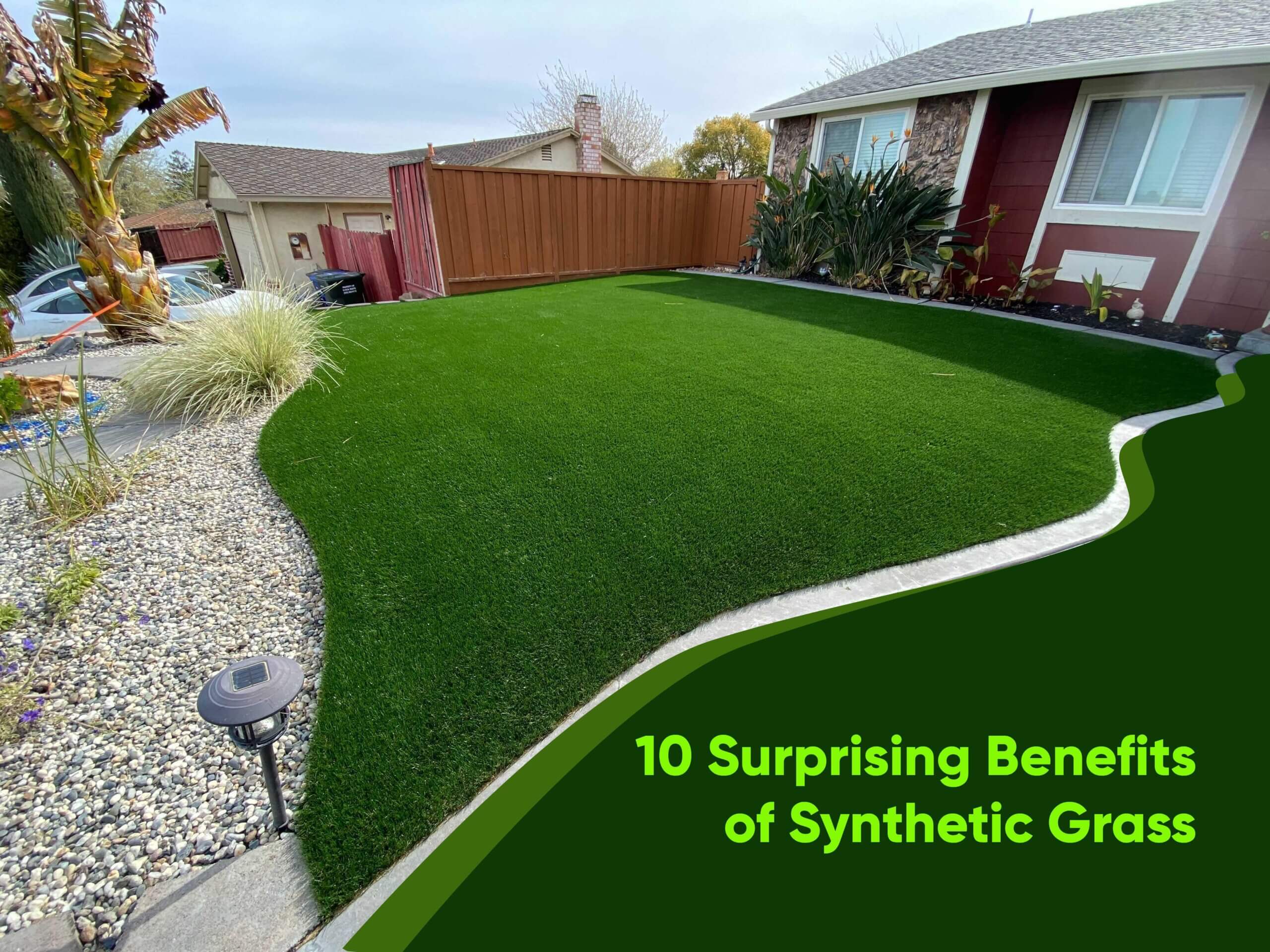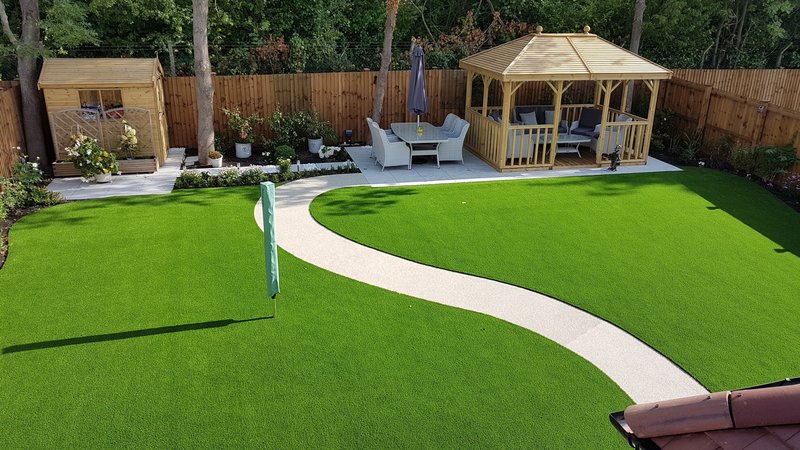Why Opt for Artificial Grass Installation in Canoga Park for Your Lawn?
Why Opt for Artificial Grass Installation in Canoga Park for Your Lawn?
Blog Article
Leading Factors to Consider Artificial Turf for a Rich and Low-Maintenance Lawn
As home owners significantly seek lasting remedies for exterior spaces, man-made yard offers an enticing choice to typical yards. Its capacity to preserve a dynamic appearance year-round without the concerns of watering, mowing, or chemical treatments makes it a functional option for those aiming to reduce upkeep efforts. Moreover, the environmental benefits, consisting of significant water conservation and decreased dependence on pesticides, straighten with contemporary ecological worths. The benefits extend beyond mere aesthetic appeals and sustainability; exploring the multifaceted implications of artificial lawn exposes a thorough strategy to backyard management that merits deeper consideration.
Year-Round Greenery
Among the most significant advantages of fabricated lawn is its ability to provide year-round greenery, regardless of climate problems. Homeowners frequently face difficulties in preserving a dynamic lawn due to seasonal adjustments, droughts, or hefty rains. Fabricated yard removes these problems, guaranteeing a constantly rich appearance throughout the year.
This artificial option is engineered to endure diverse climate situations, from scorching summertime warm to freezing winter season temperatures. Unlike natural turf, which may brownish or end up being patchy throughout severe conditions, synthetic grass preserves its vivid shade and texture, boosting the aesthetic appeal of any type of landscape.
In addition, fabricated lawn is resistant to parasites and illness that typically influence natural grass. This durability adds to its long-lasting elegance, as there is no demand for chemical treatments or plant foods that can be harmful to the setting. Additionally, property owners can appreciate the visual benefits of a properly maintained yard without the intermittent challenges postured by natural turf care (artificial grass).
Minimized Upkeep Efforts
Artificial lawn substantially lowers maintenance efforts, allowing property owners to enjoy an excellent grass without the lengthy jobs connected with all-natural yard care. One of the most remarkable advantages of synthetic grass is the removal of regular mowing. Without any requirement for a lawnmower, property owners save both time and the expense of upkeep connected with this equipment.

Cleaning artificial grass is straightforward; a straightforward rinse with a pipe or the periodic brushing to eliminate particles is generally sufficient - backyard artificial grass. This convenience of care enables property owners to spend more time enjoying their exterior rooms rather than laboring over them. In recap, the reduced upkeep initiatives related to synthetic grass make it an enticing option for those looking for a lovely, problem-free lawn
Water Conservation Conveniences
The significant reduction in maintenance efforts linked with fabricated lawn reaches water conservation, making it an eco-friendly alternative for property owners. Traditional yards require considerable amounts of water to remain lush and vibrant, usually resulting in extreme water use, particularly in dry areas. On the other hand, synthetic turf eliminates the requirement for routine watering, drastically minimizing the total water intake in your lawn.
By going with artificial grass, property owners can preserve hundreds of gallons of water every year. This change not only advantages individual houses yet also adds to broader environmental campaigns targeted at minimizing water waste. In areas experiencing water deficiency, the adoption of fabricated turf can play a considerable role in minimizing the results of dry spell and making sure that valuable water sources are used more efficiently.
Additionally, the installment of synthetic grass can aid reduced municipal water need, benefiting the community in its entirety. With expanding understanding of environmental concerns, picking fabricated yard acts as a positive action in the direction of sustainable landscaping, helping to protect all-natural water resources while keeping a cosmetically pleasing exterior space (artificial grass installation). In recap, artificial yard offers an engaging option for water conservation, aligning environmental duty with modern landscape design requirements

Parasite and Allergic Reaction Decrease
A considerable benefit of mounting artificial turf is its ability to lower parasites and allergens in outside rooms. Typical grass yards usually work as like it reproducing grounds for bugs such as insects, ticks, and ants, which can develop pain and wellness threats for families and family pets. In contrast, man-made turf removes the organic product that draws in these parasites, therefore substantially reducing their populaces in your backyard.
In addition, all-natural grass can harbor mold and mildew, pollen, and various other allergens, which can cause allergic reactions and breathing problems for sensitive people. Artificial turf gives a cleaner environment, minimizing the possibility for allergenic responses. Unlike natural yard, artificial lawn does not generate plant pollen, making it an additional info outstanding option for allergy victims looking for to appreciate their exterior spaces without the risk of flare-ups.
Additionally, the absence of soil in synthetic grass implies there is less dust and dust, further decreasing air-borne irritants. This low-maintenance alternative not just enhances the aesthetic charm of your lawn yet additionally promotes a healthier outside environment, enabling households to appreciate their lawns without the constant worry of irritants and bugs. Thus, artificial grass is a calculated option for those focusing on convenience and health in their outdoor space.
Long-Term Cost Cost Savings
Buying synthetic lawn can bring about considerable lasting price financial savings for home owners. While the first investment might appear considerable, the monetary advantages with time can be significant. Synthetic lawn gets rid of the requirement for routine lawn maintenance expenditures, such as mowing, feeding, and watering. Traditional grass commonly call for significant resources to maintain a lush appearance, especially in areas prone to drought or severe weather conditions.
Additionally, the durability of synthetic grass further boosts its cost-effectiveness. Many top notch artificial lawn products can last 15 to 25 years with very little upkeep, reducing the demand for replacement or comprehensive repair work. In comparison, all-natural turf may need constant reseeding and regular treatment, which can quickly include up in costs.
Energy savings are an additional critical variable. House owners can expect to see lower water bills, as synthetic turf does not need irrigation. In addition, the reduction in grass care solutions can release up useful time and sources, enabling property owners to allot their spending plans elsewhere.
Final Thought
In summary, artificial lawn offers various benefits for home owners seeking a vibrant and low-maintenance landscape. Eventually, the long-term cost savings connected with fabricated lawn strengthen its condition as a sustainable and useful option for improving outdoor spaces.
Synthetic lawn dramatically minimizes maintenance initiatives, enabling homeowners to enjoy an excellent lawn without the lengthy jobs linked with natural grass treatment.The substantial decrease in maintenance initiatives linked with man-made yard prolongs to water conservation, making it an eco pleasant choice for homeowners. In comparison, synthetic grass gets rid of the demand for routine watering, considerably minimizing the overall water consumption in your yard.
In areas experiencing water visit shortage, the adoption of artificial turf can play a substantial duty in minimizing the results of drought and ensuring that beneficial water resources are utilized more effectively.
With growing understanding of environmental problems, choosing man-made grass serves as an aggressive step in the direction of lasting landscape design, aiding to protect natural water sources while keeping a cosmetically pleasing outside room.
Report this page